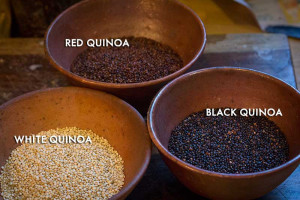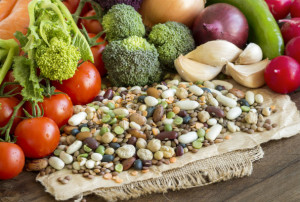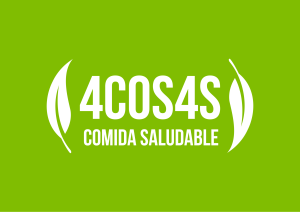By Kathryn Hayward, MD, and David L. Thomas, Jr.
 Exciting things are happening with the 4 COS4S initiative. People love the inclusiveness, creativity and joy of collaborating to encourage restaurants, schools and hospitals to offer whole food, plant-based options. In this blog, we are introducing The Home Project as a fourth 4 COS4S project to complement the other three. You don’t need to wait for a 4 COS4S restaurant near you—you can enfold 4 COS4S into your home!
Exciting things are happening with the 4 COS4S initiative. People love the inclusiveness, creativity and joy of collaborating to encourage restaurants, schools and hospitals to offer whole food, plant-based options. In this blog, we are introducing The Home Project as a fourth 4 COS4S project to complement the other three. You don’t need to wait for a 4 COS4S restaurant near you—you can enfold 4 COS4S into your home!
For those of us who rely on HappyCow to help us find whole food, plant-based restaurants, this project is particularly interesting. We all agree that eating whole, plant-based food gives our bodies nutrient-rich sustenance. Whole grains, legumes, vegetables and fruits are packed with protein, vitamins, minerals, fiber and other health-supporting ingredients. When we eliminate refined and processed products from our diets, our appetites naturally regulate, and we don’t have to count calories or worry about overeating.
We prefer the term “whole food, plant-based” rather than “vegan” because a vegan diet means merely excluding anything that comes from an animal. You could eliminate animal products entirely and not nourish yourself well because of eating mostly processed foods.
 The term “whole food, plant-based” focuses on what you actually are going to include in your diet, not on what you are excluding.
The term “whole food, plant-based” focuses on what you actually are going to include in your diet, not on what you are excluding.
Reading labels at the grocery store is important. If the ingredients are not whole foods that you would see in nature, leave it on the shelf. Michael Pollan, in his book Food Rules, compiled 64 guiding principles. Number 2 is: “Don’t eat anything your great-grandmother wouldn’t recognize as food.”
In this blog post, we offer an overview and some specific suggestions for incorporating more whole food, plant-based meals into your life. In upcoming posts, we will continue to share some of our favorite recipes and resources, including links to great websites for recipes and whole food, plant-based eating suggestions that you can weave into your 4 COS4S Home Project.
Care for Yourself
Eating more whole food, plant-based meals at home is easy. Here are ten actions from which to choose:
- Go through your kitchen pantry and give or throw away anything that is from an animal or is processed, and doesn’t meet the Michael Pollan test.
- Dedicate a newly cleaned shelf to whole food, plant-based ingredients.
- Pick one legume, one whole grain or one vegetable and make a recipe that features that ingredient.
- Buy a plant-based milk and try it (read the label and avoid the ingredient carrageenan and choose one that is not overly sweet).
- Buy a crock pot or slow cooker so that you can try a Congee Sundae for breakfast.
- Try Gallo Pinto with Salsa Lizano for breakfast one morning.
- Bring to work or school a whole food, plant-based lunch that you made at home.
- Choose one new spice and make a whole food, plant-based meal that features it.
- Have a cup of miso soup once a day (recipe below).
- Send us your recipes and experiences so that we can share them on this blog site.
Ask Others to Care for You
In our busy lives, we often eat food made by someone else. Look for locally sourced, whole food, plant-based meals that are low in processed ingredients like oils and sugar, and use spices other than salt.
- Find a local restaurant, grocery store or chef who makes healthful meals
- Order meal delivery
Two influential films have developed companies that now offer home delivery services.
Forks Over Knives offers Forks Fresh Meals
PlantPure Nation offers PlantPure Foods
The 4 COS4S Home Project
Ideas of Where To Start
Below is a shopping list from which you can choose to fill your kitchen with variety, color, scent, texture and freshness. You will see that we include every kind of fresh vegetable (it’s good to eat a range, especially cruciferous and dark green leafy vegetables and sea vegetables), whole grains (each grain is packed with nutrients, and it is good to mix it up and not just eat one!), legumes, nuts and seeds, fruits, and sweeteners that are less processed.
1. List of ingredients
Whole Grains (these grains are gluten-free and we recommend buying organic and non-GMO when you can)
Legumes
 Chickpeas (also called garbanzo beans)
Chickpeas (also called garbanzo beans)- Black beans
- Pinto beans
- Kidney beans
- Lima beans
- Navy beans and other white beans
- Lentils
Vegetables
- From the earth: eat a range of vegetables – different varieties, colors and types. Try to obtain ones grown under organic conditions so you are reducing pesticides in your diet.
- From the sea: wakame, arame, kombu, nori, hijiki
Miso
- Non-pasteurized brown rice miso (or chickpea miso) paste, aged at least 18 months
Spices
Sweeteners
- Dates, raisins and other dried fruits
- Fresh fruit
- Agave syrup or molasses in limited quantities if the unprocessed suggestions above are not sufficient
2. Suggestions for daily eating
Overall Philosophy: Decrease and try to eliminate: pesticides, preservatives, GMO products, caffeine, gluten, animal products, alcohol, added oils including canola oil, sugars, sugar substitutes.
Breakfast
- Congee: Congee is a grain-based, medicinal porridge served for centuries in traditional East Indian and Chinese homes. It is an easy and affordable dish to incorporate into any diet. It is used preventively to promote good health and strong digestion. The recipe for congee is here. It’s easier to make with a “slow cooker” or “crock pot.”
- Gallo Pinto: Gallo Pinto is a whole grain and legume mixture. Gallo Pinto has its roots in Costa Rica where it is a white rice and black bean mixture with a spicy sauce called Salsa Lizano. Our recipe makes it with brown rice and other grains. The recipe is here. You can buy the sauce in the United States or you can make a similar sauce from the recipe provided below.
- Miso soup: Miso soup is a nice breakfast beverage that can substitute for caffeinated warm beverages. It gives important nutrients that support immune function and intestinal flora. Put wakame in a cup, add boiled water and let it sit for a minute. Then add 1 to 2 tablespoons of non-pasteurized miso paste aged at least 18 months. You can also add an already-cooked grain if you wish. The key is to not boil the miso, as it is a fermented product whose benefits for your digestive system are destroyed by boiling.
Lunch and Dinner
Have each meal contain 1-2 whole grains, 1-2 legumes, and plenty of vegetables. Resources are included in this blog post, and more resources and recipes will be included in future posts.
Snacks
If you need a snack between meals, try hummus or guacamole spread on whole grain-based cakes made of brown rice or quinoa, perhaps with a slice of tomato and/or avocado on top. Adding pitted olives and tabbouleh made of quinoa or another non-wheat grain is also nice.
Fruit, raw vegetables and a mixture of nuts, seeds and dried fruits are also great snacks.
Drinks
Water, herbal teas, oat milk, rice milk, almond milk (check the ingredient list so you can avoid sugars, canola oil and carrageenan. It is best if the milk is of a grain or nut base with water and little else). You can also make your own nut or grain milk by combining nuts or grains and water in a blender or vitamix.
3. Book, web page and film suggestions
Books:
- T. Colin Campbell, “The China Study”, “Whole” and “The Low-Carb Fraud”
- Meg Wolff, “Becoming Whole”
- Neal Barnard has many good books
- The Forks Over Knives cookbooks
- The PlantPure Nation cookbook
- Meg Wolff’s cookbooks
- Michio Kushi’s cookbooks
Websites:
- Meg Wolff: www.Megwolff.com
- T. Colin Campbell Foundation: www.tcolincampbell.org/
- Forks Over Knives: www.Forksoverknives.com
- PlantPure Nation: www.plantpurenation.com
- John McDougall: http://www.drmcdougall.com/
- Neal Barnard: http://www.nealbarnard.org/
- Dean Ornish: http://ornishspectrum.com/
- Caldwell Esselstyn: http://www.dresselstyn.com/site/
- One Beet blog by Zoë Keller has many good plant-based recipes: http://www.bloglovin.com/onebeet
Films:
- Forks Over Knives
- PlantPure Nation
- Fat, Sick and Nearly Dead
- Supersize Me
- Fast Food Nation
- Food, Inc.
The 4 COS4S initiative is led by International Integrators Facilitator Caty Genestra Villalonga in Spain. 4COS4S started by inviting restaurants on the Mediterranean island of Mallorca to add to their menus “4 things” whose ingredients are whole food, plant-based and do not include any animal products and at most a small amount of refined products such as oil, sugar and salt.
 4 COS4S now includes a Restaurant Project, an Education Project, a Medical Project and a Home Project.
4 COS4S now includes a Restaurant Project, an Education Project, a Medical Project and a Home Project.
The expression “cuatro cosas” (“four things”) is used frequently in Spain. For instance, you might say, “I have to take care of four things before I leave on my vacation.” The number of things usually is not four, but the literal translation of the expression is “four things”.
4 COS4S is a way of encouraging us all to incorporate more whole, plant-based foods in our lifestyles. Through this blog, we are sharing some of the resources with which we have engaged, so that, together, we can continue our journey of learning as an International Integrators community.
Send us your experiences and recipes and we will share them with the community in upcoming blog posts!
Kathryn Hayward, M.D. was a primary care internal medicine specialist at the Massachusetts General Hospital and Harvard Medical School for 20 years. She now lives in Mallorca, Spain, where she practices Integrative Health in the United States and elsewhere through Odyssey Journey: A Collaborative Approach to Wellness, and is co-founder of International Integrators, a community devoted to the global promotion of Integrative Health.
David L. Thomas, Jr. co-founded and developed International Integrators in concert with his passionate desire to initiate change in the way that we care for ourselves and each other, and the way we interact with and affect our natural environment. He brings his background as an attorney and businessman, and his expertise in nutrition and plant-based cooking and eating, to the collaborative effort to identify, mentor and support leaders in Integrative Health. David holds a BA in Spanish Literature from Haverford College, a JD degree from Georgetown University and a certificate in plant-based nutrition from the T.Colin Campbell Center for Nutritional Studies and Cornell University.









No Comments